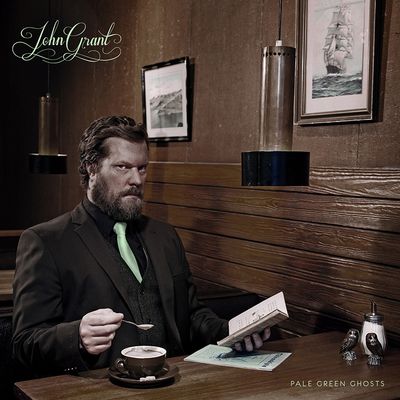John Grant: Pale Green Ghosts

The title track from John Grant’s last debut solo LP, 2010‘s critical success Queen of Denmark, was a bona fide track-of-the-year and to this day never fails to send thrills down the spine. Grant is a master of understated masculinity, tempered by self-deprecating wit and an attitude so caustic it could cut glass. For that album the core of the songs was very much Grant at a piano singing, and with Midlake as his backing band the end result was much closer to the acoustic indie that dominates these pages than the musical-theater cabaret that this style of out-and-out storytelling songwriting naturally gravitates to.
For his new record, Pale Green Ghosts, the backing band has been replaced by a more electronic sensibility. This time Grant’s channeling the essence of Cabaret Voltaire, and the title track pulses with synthetic bass lines and harsh horn stabs that paint a very different picture from what a listener familiar with QOD might be expecting. The opener is maybe an extreme example, and elsewhere there’s the familiar rhythm section in the same vein as the last record, but it serves as a good statement of intent. Throughout this LP the synths and electronica seep in to most aspects of the music, and the overall effect is a marked one. For all the differences, however, the songs remain the same. These little vignettes, these mini-operas are delivered with the same dry humour and cynical baritone that has become Grant’s calling card.
Sadly, despite the fantastic sage-green double vinyl and stunning gatefold sleeve, this record is not the tour-de-force I was hoping for. The problems are all issues that first raised their ugly heads on the last record, and the main one is that the words totally dominate the songs. This is not a record for casual listening; stop following the lyrics intently and the whole thing falls apart.
That’s not to say that the aesthetic is unpleasant – the music on QOD was exactly what one has come to expect from Midlake (a.k.a. very good) and the new style is equally engaging – the real trouble, it seems, lies with the structuring of the songs. The monotonous plod of the radio-friendly Greatest Motherfucker typifies this perfectly; quoting lyrics out of context has never been what this site’s about, but rest assured this is a haunting, one-part-wit to two-parts-acerbic-disgust little ditty that has an equal chance of splitting your sides or breaking your heart. Take away the words and it all falls apart.
Despite all the pleasant musical touches, the soaring lifts, the drama, the dynamics, the obvious sophistication, this record can be damnably boring. When John Grant is good he’s very very good, but when he’s bad he’s rotten.